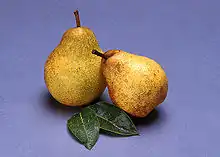pera
Asturian
Etymology
From Vulgar Latin *pira, from the plural of Latin pirum, reanalyzed as a feminine singular.
Further reading
- “pera” in Diccionario general de la lengua asturiana. Xosé Lluis García Arias. →ISBN.
Catalan
Etymology
From Old Occitan pera, from Vulgar Latin *pira, from the plural of Latin pirum, reanalyzed as a feminine singular.
Pronunciation
Further reading
- “pera” in Diccionari de la llengua catalana, segona edició, Institut d’Estudis Catalans.
- “pera” in Gran Diccionari de la Llengua Catalana, Grup Enciclopèdia Catalana.
- “pera” in Diccionari normatiu valencià, Acadèmia Valenciana de la Llengua.
- “pera” in Diccionari català-valencià-balear, Antoni Maria Alcover and Francesc de Borja Moll, 1962.
Faroese
Pronunciation
- IPA(key): /ˈpʰeːɹa/
- Rhymes: -eːɹa
Declension
| Declension of pera | ||||
|---|---|---|---|---|
| f1 | singular | plural | ||
| indefinite | definite | indefinite | definite | |
| nominative | pera | peran | perur | perurnar |
| accusative | peru | peruna | perur | perurnar |
| dative | peru | peruni | perum | perunum |
| genitive | peru | perunnar | pera | peranna |
Galician
Etymology
From Old Portuguese pera, from Vulgar Latin *pira, from the plural of Latin pirum, reanalyzed as a feminine singular.
Related terms
Icelandic
Pronunciation
- IPA(key): /ˈpʰɛːra/
- Rhymes: -ɛːra
Italian

Etymology
From Vulgar Latin *pira, from the plural of Latin pirum, reanalyzed as a feminine singular.
Pronunciation
Audio (file)
Noun
pera f (plural pere)
Latin
Etymology
From Ancient Greek πήρα (pḗra).
Pronunciation
- (Classical) IPA(key): /ˈpeː.ra/
- (Ecclesiastical) IPA(key): /ˈpe.ra/, [ˈpeː.ra]
Declension
First declension.
| Case | Singular | Plural |
|---|---|---|
| Nominative | pēra | pērae |
| Genitive | pērae | pērārum |
| Dative | pērae | pērīs |
| Accusative | pēram | pērās |
| Ablative | pērā | pērīs |
| Vocative | pēra | pērae |
Derived terms
References
- pera in Charlton T. Lewis and Charles Short (1879) A Latin Dictionary, Oxford: Clarendon Press
- pera in Charlton T. Lewis (1891) An Elementary Latin Dictionary, New York: Harper & Brothers
- pera in Charles du Fresne du Cange’s Glossarium Mediæ et Infimæ Latinitatis (augmented edition, 1883–1887)
- pera in Harry Thurston Peck, editor (1898) Harper's Dictionary of Classical Antiquities, New York: Harper & Brothers
- pera in William Smith, editor (1848) A Dictionary of Greek Biography and Mythology, London: John Murray
- pera in William Smith et al., editor (1890) A Dictionary of Greek and Roman Antiquities, London: William Wayte. G. E. Marindin
Lindu
Occitan
Etymology
From Old Occitan pera, from Vulgar Latin *pira, from the plural of Latin pirum, reanalyzed as a feminine singular.
Pronunciation
- IPA(key): [ˈpeɾo]
Old Portuguese
Pronunciation
- IPA(key): /ˈpe.ɾa/
Preposition
pera
- for, towards
- 13th century, attributed to Alfonso X of Castile, Cantigas de Santa Maria, E codex, cantiga 100 (facsimile):
- Santa maria / ſtrela do dia / moſtra nos uia / pera deus ⁊ nos guia.
- Holy Mary, / star of the daytime; / show us the way / towards God, and guide us.
- Santa maria / ſtrela do dia / moſtra nos uia / pera deus ⁊ nos guia.
- 13th century, attributed to Alfonso X of Castile, Cantigas de Santa Maria, E codex, cantiga 100 (facsimile):
Etymology 2
From Vulgar Latin *pira, from the plural of Latin pirum, reanalyzed as a feminine singular.
Polish
Pronunciation
- IPA(key): /ˈpɛ.ra/
Declension
Portuguese

Etymology 1
From Old Portuguese pera, from Vulgar Latin *pira, from the plural of Latin pirum, reanalyzed as a feminine singular.
Alternative forms
- pêra (superseded)
Etymology 2
Clipping of espera.
Interjection
pera
- (colloquial) just a minute
- (colloquial) wait (asking for stop to make an observation)
Synonyms
Spanish
Etymology
From Old Spanish pera, from Vulgar Latin *pira, from the plural of Latin pirum, reanalyzed as a feminine singular.
Pronunciation
- IPA(key): /ˈpeɾa/
Derived terms
Descendants
- → Jicarilla: béela
Further reading
- “pera” in Diccionario de la lengua española, Vigésima tercera edición, Real Academia Española, 2014.
Swahili
Etymology
From Portuguese pera (“pear”).
Veps
Etymology
Related to Finnish perä.
Inflection
| Inflection of pera | |||
|---|---|---|---|
| nominative sing. | pera | ||
| genitive sing. | peran | ||
| partitive sing. | perad | ||
| partitive plur. | peroid | ||
| singular | plural | ||
| nominative | pera | perad | |
| accusative | peran | perad | |
| genitive | peran | peroiden | |
| partitive | perad | peroid | |
| essive-instructive | peran | peroin | |
| translative | peraks | peroikš | |
| inessive | peras | peroiš | |
| elative | peraspäi | peroišpäi | |
| illative | ? | peroihe | |
| adessive | peral | peroil | |
| ablative | peralpäi | peroilpäi | |
| allative | perale | peroile | |
| abessive | perata | peroita | |
| comitative | peranke | peroidenke | |
| prolative | peradme | peroidme | |
| approximative I | peranno | peroidenno | |
| approximative II | perannoks | peroidennoks | |
| egressive | perannopäi | peroidennopäi | |
| terminative I | ? | peroihesai | |
| terminative II | peralesai | peroilesai | |
| terminative III | perassai | — | |
| additive I | ? | peroihepäi | |
| additive II | peralepäi | peroilepäi | |
References
- Zajceva, N. G.; Mullonen, M. I. (2007), “корма”, in Uz’ venä-vepsläine vajehnik / Novyj russko-vepsskij slovarʹ [New Russian–Veps Dictionary], Petrozavodsk: Periodika